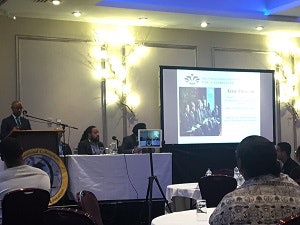DUBLIN — Colleges and universities should be much more aggressive in recruiting and preparing Black males to become school teachers.
That was one of the many sentiments expressed on Thursday among scholars and practitioners who gathered at the International Colloquium on Black Males in Education in Dublin.
The number of Black males in the U.S. teacher workforce continues to hover at about 2 percent – a dismal number — that former U.S. Secretary of Education Arne Duncan tried to tackle back in March 2012 when he launched a national initiative aimed at recruiting and training 80,000 new teachers.
In other countries across the globe, the numbers are equally troubling.
Dr. Chance W. Lewis, the Carol Grotnes Belk Distinguished Professor of Urban Education at the University of North Carolina-Charlotte said that colleges and universities in the U.S. could do more to steer Black male athletes at their institutions to consider pursuing teacher education programs.
 Dr. Chance W. Lewis speaking at the International Colloquium on Black Males in Education.
Dr. Chance W. Lewis speaking at the International Colloquium on Black Males in Education.“This is the opportunity for recruitment,” said Lewis. “All it would take is a conversation across campus.”
That conversation — between faculty, athletic advisers and coaches — is critical to increasing the numbers, said Lewis, whose book Black Male Teachers: Diversifying the United States’ Teacher Workforce that he co-wrote with Dr. Ivory A. Toldson, has been hailed as a roadmap for preparing administrators on how best to train Black male students for a career in education.
Lewis said that he’s witnessed an increased in the number of education majors among Black males once an institution has created a pipeline and has made this issue a top priority.
“There is tremendous opportunities on your campus,” Lewis told those at the colloquium, adding that Black male graduates of teacher education programs have a strong track record of gaining employment post-graduation and can also coach a sport in addition to teaching in their subject area.
Now in its seventh year, the colloquium has become a meeting place for interdisciplinary scholars and practitioners from across the world to commune and discuss critical outcomes for young Black males and boys.
“This year’s colloquium has been emotionally and psychologically transformative,” said Dr. James L. Moore, III., Vice Provost for Diversity at The Ohio State University and co-chair of the colloquium. “This year we attracted the right stakeholders, thought leaders, researchers and students to advance the work around Black males beyond the continental divide.”
Dr. Lemuel W. Watson, the dean of the School of Education at Indiana University and Dr. Gregory J. Vincent, the CEO and chairman of Sigma Pi Phi are among some of those prominent stakeholders.
Dr. Jerlando F.L. Jackson, the Vilas Distinguished Professor of Higher Education at University of Wisconsin-Madison and the chair of the colloquium, said that the decision to examine Frederick Douglass’s time in Ireland in a year that the world is celebrating his 200th birthday, is particularly meaningful.
“The 2018 Colloquium has been a tremendous learning experience that has drawn important and critical connections between Ireland and Black America,” said Jackson. “Participants have gotten to hear about the origins of the term ‘political blackness” and the times and contributions of Frederick Douglass.
He said that the first three years of the gathering was intentionally smaller and participation was by invitation only.
Since then, there has been a steady and growing interest in the colloquium.
“I certainly have appreciated the growth, the committed returnees and the new participants each year,” said Jackson. “I’m delighted that folks saw value in the Colloquium being in Ireland and how Frederick Douglass provides us a platform to clarify the impact that Black males have had internationally for quite some time.”
Jamal Watson can be reached at [email protected]. You can follow him on Twitter @jamalericwatson



















